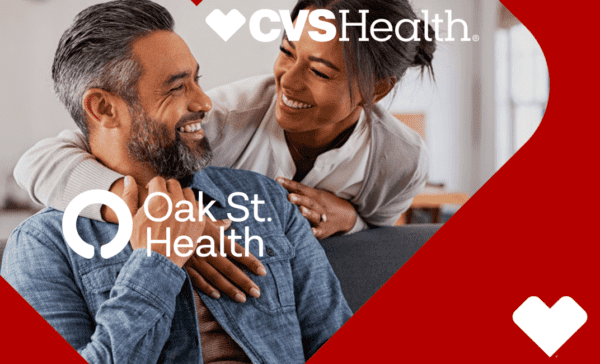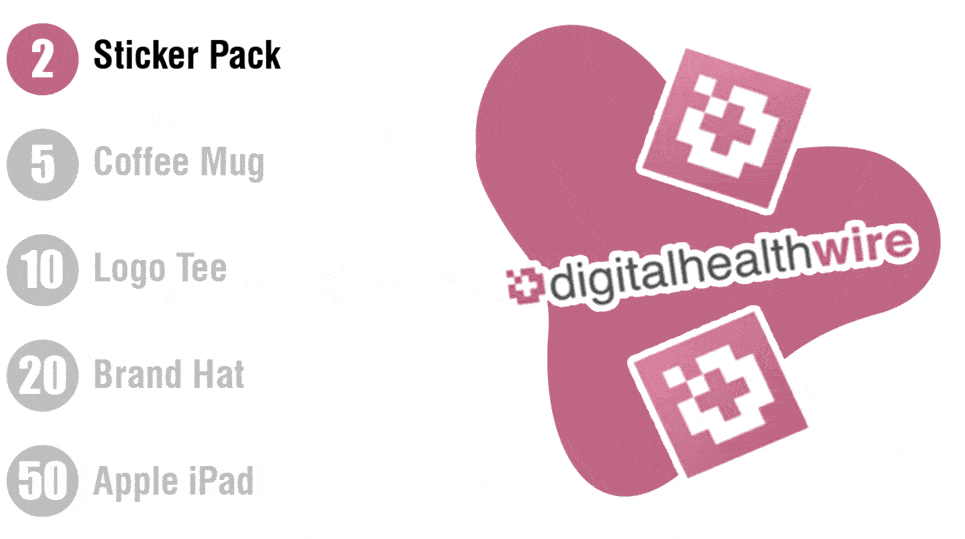|
CVS Acquires Oak Street | AI Algorithm Boom
February 9, 2023
|
|
|

|
|
Together with
|

|
|
|
“There is no one-and-done asset.”
|
|
CVS Health CFO Shawn Guertin
|
|

|
|
CVS said it was going to do it. People doubted CVS would do it. CVS did it.
To say that the retail health giant’s fourth quarter revenue beat was overshadowed would be an understatement, but in case your internet was out this week: CVS acquired Oak Street Health for $10.6B ($39/share).
Here’s the Q4 report by the numbers, then we’ll get to the juicy stuff:
- Full year revenue of $322.5B, up 10% (Caremark up, Aetna up, Retail up)
- CVS now 5th largest US company by revenue after Apple, Amazon, Walmart, United
- Full year net income of $4.2B, down 48% ($5B of opioid lawsuits didn’t help)
Now for Oak Street. The general idea behind the acquisition is also the title of its snazzy investor presentation: Creating the Premier Medicare Value-Based Care Platform.
- Oak Street Health employs 600 primary care physicians across 169 clinics. It focuses on capitated primary care for Medicare Advantage and Medicare (59k at-risk patients).
- Unlike many of the other primary care operators left on the market after Amazon / One Medical and VillageMD / Summit, Oak Street has locations in 21 states – decent enough proof that the model is scalable and translates to different geographies.
- It’s also one of the only companies that checks every box on CVS’ list: strong leadership; integrated tech platform; agnostic to different geographies and payors; demonstrable capability to improve outcomes; clear path toward profitability.
As for synergies, CVS sees 500 million of them, or at least five that can unlock $500M in value.
- Accelerating Oak Street patient growth through CVS Health channels
- Improving Oak Street’s economics through integration with CVS assets
- Improving the retention of Aetna MA members through the Oak Street experience
- Driving greater utilization of CVS Pharmacy and Caremark capabilities
- Reducing costs from external public company and lease expenses
The Takeaway
CVS is a big company, and it needed to acquire a big player to move the needle in primary care. Although $10.6B is a hefty cost – and definitely a result of the physician M&A wars that CVS helped start – it only represents a 3.1x multiple on Oak Street’s project revenue for 2023. By comparison, Amazon forked over a 2.9x multiple for One Medical half a year ago.
Looking ahead, CVS expects Oak Street to expand to 300 clinics by 2026 at its current growth trajectory and without any further boost from the acquisition. When asked about this on its conference call, CVS said that it’s “exploring alternative avenues of accelerating synergy realization.” Buzzword Bingo. That means CVS doesn’t have a plan to speed this up yet, but it’s looking into it.
Either way, it’s hard to imagine that CVS’ existing scale won’t help make this work for both sides. CVS unlocks extra capacity with 1,100 MinuteClinics, has Aetna plans that can highlight Oak Street, and might soon have Signify home visits bringing patients into the ecosystem. This is a tipping point acquisition, and it’ll be exciting to watch.
|




|
|
unResign From Nursing with connectRN
connectRN’s new campaign unResignation Notice is helping nurses recommit to the profession they love by highlighting both the challenges they face and the reasons why they want to return. “It’s not in a nurse’s nature to quit. Something needs to change, and it’s not the nurses.” Learn more and sign your own unResignation Letter here.
|
|
4 Tips for Licensing Your Telehealth Providers
Telemedicine is the next frontier of care delivery, yet many providers continue to be hampered by the complex process of medical licensing. If you’re one of them, check out Medallion’s four tips for licensing your telehealth providers.
|
|
- AI Algorithm Boom: Here’s a cool overview on the growth of FDA cleared AI medical algorithms since the first one was approved in 1995. More than half of the 520 currently cleared algorithms were approved between 2019 and 2022, with most of that stemming from radiology use cases. That said, algorithms don’t require FDA clearance if they don’t directly impact clinical care, so AI applications within common digital health venues like population health or hospital analytics aren’t included in the count.
- GenieMD Integrates ChatGPT: ChatGPT’s healthcare takeover has officially begun, with GenieMD integrating the large language model into its virtual care platform to provide patients with personalized answers to their health questions. The integration enhances ChatGPT with individual patient information to contextualize the responses as seen here. Expect plenty more of this to roll out quickly.
- ShiftMed Scores $200M: ShiftMed secured $200M in fresh funding to expand the national footprint of its W-2 workforce management platform across all segments of the healthcare market. ShiftMed provides access to a local marketplace with over 350k credentialed W-2 healthcare workers and an automated workforce management platform that enables acute, post-acute, and in-home providers to dynamically manage their resources.
- Patient Information Retention: Patient perception of how well they can retain care information differs drastically from how well they can actually retain it. That’s according to a new 53 participant study in the Joint Commission Journal on Quality and Patient Safety, which found that while over 90% of patients felt confident in their knowledge of their treatment plan, fewer patients were able to correctly recall their diagnosis (58.5%), inpatient treatment (64.2%), post discharge plans (50.9%), and medication changes (43.4%).
- Payor Tactics Exposé: A ProPublica exposé on the hidden procedures payors use to reject claims recently caught a ton of attention… and definitely more than UnitedHealthcare would have liked. The article follows one Penn student’s battle for coverage of his treatment for ulcerative colitis, which culminated in a lawsuit that uncovered a fireworks show of internal emails, tape-recordings of employees, and other behind-the-scenes tactics used to deny coverage.
- Nurse Understaffing Impact: A Michigan Nurses Association survey revealed that nurse understaffing is becoming more deadly for patients, with 42% of nurses reporting knowledge of a patient death caused by nurses being assigned too many patients (up from 22% in 2016). Among 400 nurses surveyed, 25% are assigned unsafe patient loads almost every shift (up from 7% in 2016), and over 90% support the Safe Patient Care Act to limit the number of patients a hospital nurse can be assigned.
- Biofourmis + Beacon: Indiana-based Beacon Health System is leveraging Biofourmis tech for a post-discharge RPM program for complex chronic conditions such as congestive heart failure and chronic obstructive pulmonary disease. Beacon is initially launching the program at two of its largest hospitals – Elkhart General Hospital and Memorial Hospital.
- Levels Lands $7M: Digital nutrition startup Levels landed $7M through a Series A extension (original $38M Series A was in April 2022) as it develops software that provides real-time feedback on how food affects health. The funding will support Levels’ suite of member services, including the nutrition feedback app, virtual community, and access to CGMs and blood testing for metabolic marker tracking.
- Loneliness and Heart Failure: A new study published in JACC shows that both social isolation and loneliness are associated with higher rates of heart failure, but whether or not a person feels lonely is more important in determining risk than if they are actually alone. The authors analyzed UK Biobank data (n=400k; 12 years) and found that both social isolation and loneliness increased the risk of hospitalization or death from heart failure by 15-20%, underscoring the growing need for social care in modern healthcare models.
- Teal Seed Round: Teal Health scored an $8.8M seed round to advance the clinical testing and de novo clearance of its at-home cervical cancer screening solution. Teal’s screening kit comes with a novel “collection wand” designed to be more convenient and comfortable than an in-person pap smear, as well as access to an online platform where users can speak with clinicians about their results.
- Bayer Partners With Huma: Bayer is partnering with health data platform Huma Therapeutics to co-develop the Bayer Aspirin Heart Risk Assessment. The online tool quickly assesses an individual’s risk factors for developing cardiovascular disease over the next 10 years, which can then be shared with physicians as part of ongoing health management.
|
|
Human Factors in Medical Device Design
How patients interact with a medical device can have as much impact as the device itself. Check out this Q&A with Hyperfine Lead Product Designer Corinne Hay to learn how human factors influence the design of everything from prescription containers to portable MRI systems.
|
|
Ultimate Guide to Selecting Your Drug Database
Do your providers need easy access to real-time drug knowledge and clinical decision support? Join Synapse Medicine CEO Clement Goehrs, MD, MSc on February 22nd to discover the essential factors to consider when selecting a drug database for your health tech product.
|
|
Clinical Documentation Integrity For VBC
The growing use of risk-adjusted reimbursement in outpatient settings means clinical documentation needs to keep up, or health systems risk leaving revenue on the table. Check out Nuance’s new blog to learn how shifting reimbursement models make clinical documentation excellence more important than ever, and how AI can help you achieve it.
|
|
|
Share Digital Health Wire
|
|
Spread the news & help us grow ⚡
|
|
Refer colleagues with your unique link and earn rewards.
|

|
|
|
|
Or copy and share your custom referral link: *|SHAREURL|*
|
|
You currently have *|REFERRALS|* referrals.
|
|
|
|
|